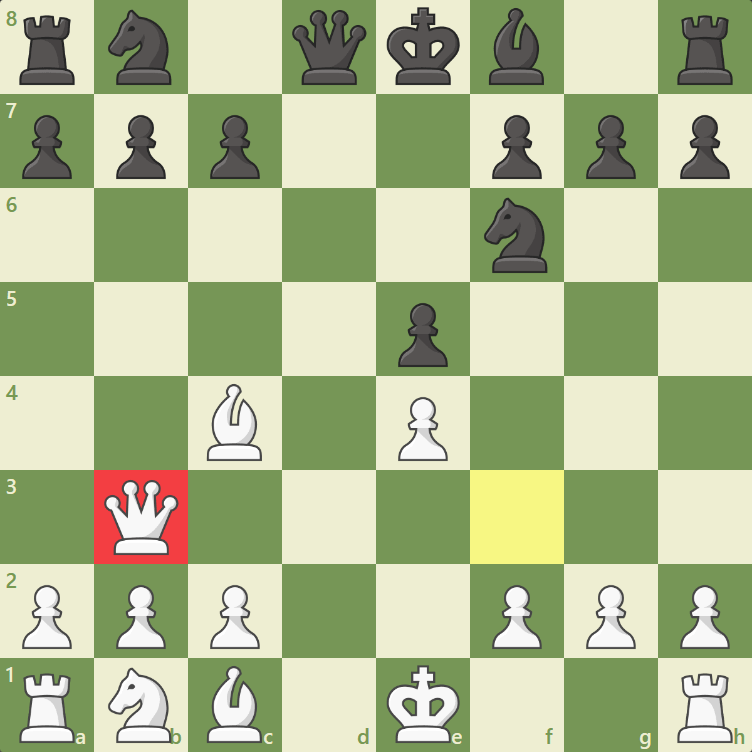Should You Ever Sacrifice Your Queen? Rethinking Chess's Most Powerful Piece
 The queen. In the world of chess, it reigns supreme. Combining the mobility of a bishop and rook, it's a force to be reckoned with, capable of delivering checkmate or wreaking havoc on your opponent's position.
The queen. In the world of chess, it reigns supreme. Combining the mobility of a bishop and rook, it's a force to be reckoned with, capable of delivering checkmate or wreaking havoc on your opponent's position.
But is sacrificing this powerhouse ever a good idea? Conventional wisdom might suggest holding onto your queen at all costs. However, the truth, as with many things in chess, is a little more nuanced.
The Queen's Power: A Double-Edged Sword
 There's no denying the queen's immense value. It controls eight squares of any color and can move any distance in a straight line. This versatility makes it a potent weapon for attack, defense, and maneuvering. However, this very strength can also be a weakness.
There's no denying the queen's immense value. It controls eight squares of any color and can move any distance in a straight line. This versatility makes it a potent weapon for attack, defense, and maneuvering. However, this very strength can also be a weakness.
Target Practice: The queen's expansive movement makes it a prime target for your opponent. Unlike other pieces, it can't hide behind pawns and is constantly vulnerable to forks, pins, and skewers. Losing your queen often leaves you with a significant material disadvantage.
Overdependence: Beginners often rely heavily on the queen, neglecting the development of other pieces. This can lead to a predictable and easily countered playing style.
The Art of Sacrifice: When Giving Up the Queen Makes Sense
While sacrificing the queen might seem like a desperate act, in the hands of a skilled player, it can be a game-winning strategy. Here are some scenarios where parting with your queen might be the best course of action:
Checkmate: There are specific checkmating patterns, like the smothered mate or the queen sacrifice followed by back rank checkmate, where giving up your queen is the only way to deliver checkmate.
Opening Up Lines: Sometimes, a queen sacrifice can open up critical lines for your rooks or other pieces, leading to a devastating attack or a winning positional advantage. This is often seen in gambit openings, where a pawn or piece (sometimes even the queen) is sacrificed for faster development and attacking chances.
Exploiting Weaknesses: If your opponent's king is poorly defended or their position has critical weaknesses, a queen sacrifice can exploit these vulnerabilities and create an unstoppable attack.
Famous Queen Sacrifices
Chess history is filled with legendary queen sacrifices that demonstrate their strategic brilliance. Here are a couple of examples:
Nezhmetdinov vs. Chernikov, 1962: This game shocked the chess world. In a seemingly losing position, Nezhmetdinov sacrificed his queen to exploit weaknesses in Chernikov's king's defense. The resulting attack led to a stunning victory.
Fischer vs. Spassky, 1972: In their legendary World Championship match, Bobby Fischer sacrificed his queen in the 6th game to create a powerful passed pawn that ultimately led to victory.
Learning to Sacrifice Wisely:
While sacrificing the queen can be a powerful tool, it shouldn't be taken lightly. Here are some points to consider before making this bold move:
Calculate Accurately: A queen sacrifice should never be a guess. You need to calculate deeply to ensure it leads to a winning advantage, not a quick loss.
Positional Understanding: Sacrificing the queen is often about exploiting weaknesses in your opponent's position. Understanding the strategic implications is crucial.
Don't Fall for Blunders: Giving up your queen for no reason is simply throwing away the game. Make sure your sacrifice has a clear purpose and objective.
Conclusion
The queen remains the most powerful piece in chess. However, its strength lies not just in its raw power, but also in its ability to be used strategically. Sacrificing the queen can be a risky yet rewarding maneuver that separates grandmasters from beginners. By understanding the when, why, and how of queen sacrifices, you can elevate your chess game to a whole new level. Remember, sometimes, giving up the most valuable piece can lead to the most valuable victory.


































